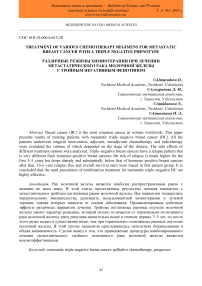Treatment of various chemotherapy regimens for metastatic breast cancer with a triple negative phenotype
Автор: Almuradova Dilbar, Atakhanova Nigora
Журнал: Бюллетень науки и практики @bulletennauki
Рубрика: Медицинские науки
Статья в выпуске: 3 т.4, 2018 года.
Бесплатный доступ
Breast cancer (BC) is the most common cancer in women worldwide. This paper presents results of treating patients with metastatic triple-negative breast cancer (BC). All the patients underwent surgical intervention, adjuvant, neoadjuvant chemotherapy and radiotherapy were evaluated the volume of which depended on the stage of the disease. The side effects of different treatment options were analyzed. Triple-negative breast cancers have a relapse pattern that is very different from hormone-positive breast cancers: the risk of relapse is much higher for the first 3-5 years but drops sharply and substantially below that of hormone-positive breast cancers after that. Five-year relapse-free and overall survival rates were traced in this patient group. It is concluded that the used procedures of combination treatment for metastatic triple-negative BC are highly effective.
Metastatic triple-negative breast cancer, palliative chemotherapy, prognoses
Короткий адрес: https://sciup.org/14111913
IDR: 14111913 | УДК: 618.19-006.6:615.28 | DOI: 10.5281/zenodo.1197743
Список литературы Treatment of various chemotherapy regimens for metastatic breast cancer with a triple negative phenotype
- Anders, C. K., Wiener, E. P., & Ford, J. M., et al. (2013). Poly (ADP-ribose) polymerase inhibition: a "target" therapy for triple negative breast cancer. Clin Cancer Res, 16, (19), 4702-10
- Mehta, R. S. (2012). Dense-dose and/or metronome schedule of specific chemotherapy consolidation chemosensitivitytriple-negative breast cancer: a step toward reversing the triple negative paradox. J. ClinOncol, 26, (19), 3286-3288
- Silver, D. R., Richardson, A. L., Eklund, A. C., & al. (2010). Efficacy of cisplatin in triple negative breast cancer. J Clin.Oncol, 28, (7), 1145-53
- Peto, R, Davies, C., Godwin, J, & al. Comparisons between different polychemotherapy regimens for early detection of breast cancer: a meta-analysis of long-term outcomes among 100,000 women in 123 randomized trials. Lancet, 379, (9814), 432. http://mammalogy.eurodoctor.ru/chemotherapy/breast/cancer.
- Andre, F., & Zielinski, C. (2013) Optimal strategies for metastatic triple negative breast cancer with currently approved agents. Ann. Oncol., 24, (4), 46-51.
- Maggie, C. U., Cheang, D. V., & Bajdik, Ch., & al. (2014). Basal-Like Breast Cancer Defined by Five Biomarkers Has Superior Prognostic Value than Triple-Negative Phenotype. Clin Cancer Res,14, 1368-1376
- Minckwitz, G., Rezai, M., Loibl, S., & al. (2010). Capecitabine in addition to anthracycline-and taxane-based neoadjuvant treatment in patients with primary breast cancer: phase III GeparQuattrostudy. J Clin Oncol, 28, (12), 2015-2023
- Gluz, O., Nitz, U. A., Harbeck, N., & al. (2011). Triple-negative high-risk breast cancer derives particular benefit from dose intensification of palliative chemotherapy: Results of WSG AM-01 trial. Ann Oncol, 19, 861-70
- Dear, R. F., McGeechan, K., Jenkins, M. C., Barratt, A., Tattersall, M. H., & Wilcken, N. (2013). Combination versus sequential single agent chemotherapy for metastatic breast cancer. Cochrane Database Syst Rev, 12, CD008792
- Burzykowski, T., Buyse, M., Piccart-Gebhart, M. J., & al. (2008). Evaluation of tumor response, disease control, progression-free survival, and time to progression as potential surrogate end points in metastatic breast cancer. J ClinOncol, 26, (12), 1987-1992
- Robertson, J. F., Howell, A., Buzdar, A., von Euler, M., & Lee, D. (1999). Static disease on anastrozole provides similar benefit as objective response in patients with advanced breast cancer. Breast Cancer Res Treat, 58, (2), 157-162
- Carrick, S., Parker, S., Thornton, C. E., Ghersi, D., Simes, J., & Wilcken, N. (2009). Single agent versus combination chemotherapy for metastatic breast cancer. Cochrane Database Syst Rev, 2, CD003372
- Gennari, A, Stockler, M, Puntoni, M, & al. (2011). Duration of chemotherapy for metastatic breast cancer: a systematic review and meta-analysis of randomized clinical trials. J ClinOncol, 29, 2144
- Park, Y. H., Jung, K. H., Im, S. A., & al. (2013). Phase III, multicenter, randomized trial of maintenance chemotherapy versus observation in patients with metastatic breast cancer after achieving disease control with six cycles of gemcitabine plus paclitaxel as first-line chemotherapy: KCSG-BR07-02. J.ClinOncol, 31, 1732
- Eisenhauer, E. A., Therasse, P., Bogaerts, J., & al. (2009). New response evaluation criteria in solid tumours: revised RECIST guideline (version 1.1). Eur J Cancer, 45, 228
- Mauri, D., Kamposioras, K., Tsali, L., & al. (2010). Overall survival benefit for weekly vs. three-weekly taxanes regimens in advanced breast cancer: a meta-analysis. Cancer Treat Rev, 36, 69
- Sparano, J. A., Wang, M., Martino, S., & al. (2008). Weekly paclitaxel in the adjuvant treatment of breast cancer. N Engl J Med, 358, (16), 1663-1671
- Piccart, M. J., Klijn, J., Paridaens, R., & al. (1997). Corticosteroids significantly delay the onset of docetaxel-induced fluid retention: final results of a randomized study of the European Organization for Research and Treatment of Cancer Investigational Drug Branch for Breast Cancer. J Clin Oncol, 15, 3149


